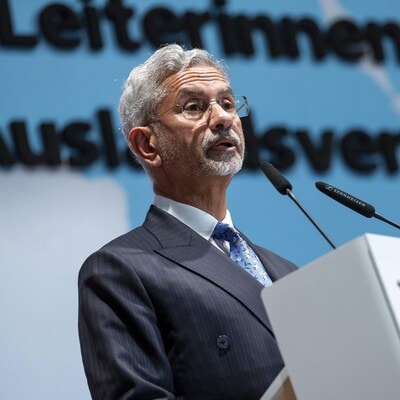
File photo of Foreign Minister of India Subrahmanyam Jaishankar. (Photo: PTI)
External Affairs Minister (EAM) S Jaishankar on Wednesday expressed his confidence that India’s relations with its neighbours, Sri Lanka and Bangladesh, would remain positive and constructive, despite the recent developments in the two nations.
“I’m very confident that in our neighbourhood, the realities of interdependence or mutual benefit and our ability to get along will serve both our interests,” Jaishankar stated, adding, “Those realities will assert themselves. That’s been the history.”
Jaishankar further noted that every few years, some event occurs in the region, and people suggest there is an irretrievable situation. “You then see the correctives beginning to manifest themselves,” he explained, adding, “So, I would take it in that spirit and am quite confident that in both these cases (Sri Lanka and Bangladesh), our relationship would continue to be positive and constructive.”
Why is Jaishankar optimistic about India-Sri Lanka ties?
Regarding Sri Lanka, Jaishankar highlighted that India had extended timely aid during Colombo’s severe economic crisis of 2022.
Jaishankar reiterated that political developments in Sri Lanka are matters for Sri Lanka to handle.
He also explained that each neighbouring country has its own unique dynamics, and it is not India’s place to dictate them.
Marxist-leaning politician Anura Kumara Dissanayake, noted for his past pro-China inclinations, was sworn in as Sri Lanka’s new President on Monday. This event has been closely monitored by India, especially in the wake of the removal of Sheikh Hasina in Bangladesh, sparking concerns that anti-India elements in the region could gain strength.
Dissanayake’s win in Saturday’s election, where he outperformed major candidates, including the incumbent President Ranil Wickremesinghe and Namal Rajapaksa, marks a significant shift in Sri Lanka’s political landscape.
The election, which followed mass protests that led to Gotabaya Rajapaksa’s removal in 2022, carried high stakes for New Delhi due to its major geopolitical and security interests in the Indian Ocean.
In Sri Lanka, India reportedly favoured the continuity that Ranil Wickremesinghe or the pro-India opposition leader Sajith Premadasa would have provided.
However, India chose to remain neutral in the Sri Lankan elections.
Indian media reports have highlighted Dissanayake’s past pro-China leanings.
For example, Dissanayake recently attracted attention after announcing plans to cancel a 450 MW wind power project led by Gautam Adani’s Adani Group.
But, the situation may not be as challenging as initially expected. In recent times, Dissanayake has signalled a willingness to engage with New Delhi, suggesting a potential shift in his stance.
During his campaign, Dissanayake assured that he would not allow Sri Lanka’s territory, sea, or airspace to be used in ways that would threaten India or regional stability.
Despite the complexities of working with a relatively unknown leader, India’s assistance to Sri Lanka, including $4.5 billion in economic aid and support for debt restructuring, also provides a strong foundation for future relations.
New Delhi’s recent outreach to Dissanayake is also expected to be advantageous. In February, Dissanayake visited New Delhi at the invitation of the Indian government.
Why is Jaishankar optimistic about India-Bangladesh ties?
In discussing Bangladesh, Jaishankar focused on the mutual economic benefit both nations have derived from stable ties.
Under Hasina’s leadership, Bangladesh was a stable partner, working with India to curtail anti-India terrorist groups. Since Hasina’s rise to power in 2009, she played a pivotal role in maintaining this relationship.
However, Hasina resigned as Prime Minister and fled to India on August 5 following unprecedented student-led protests against her government. She was replaced by an interim government led by Nobel laureate Muhammad Yunus.
In an interview earlier this month, Jaishankar described Bangladesh’s political turmoil as an “internal matter,” while expressing India’s desire to maintain its previously stable ties with the country.
Hasina fled to India aboard a military aircraft and is reportedly under the protection of Indian intelligence agencies. Initially, there was speculation that she would seek asylum in London, but British regulations prevent entry for asylum seekers under such circumstances. Her continued stay in India, coupled with informal calls for her extradition, complicates New Delhi’s efforts to maintain stable relations with Dhaka.
In a stern message, Chief Advisor Yunus has insisted that Hasina must remain silent while in India to avoid disrupting bilateral relations. “If India wants to keep her until Bangladesh wants her back, the condition would be that she has to keep quiet,” he has asserted.
First Published: Sep 25 2024 | 2:12 PM IST











